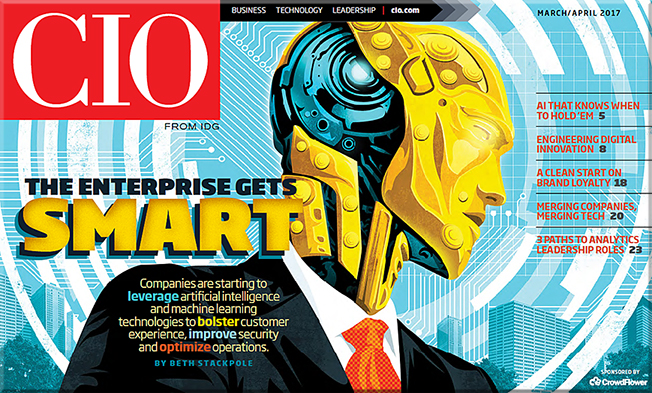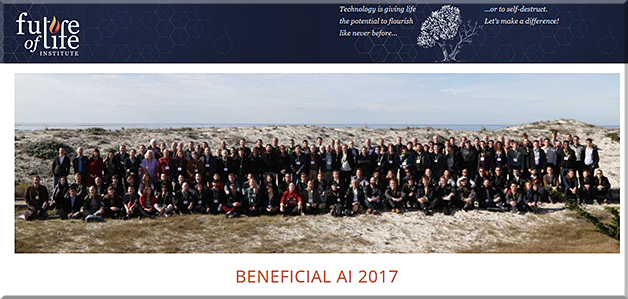The Enterprise Gets Smart
Companies are starting to leverage artificial intelligence and machine learning technologies to bolster customer experience, improve security and optimize operations.
Excerpt:
Assembling the right talent is another critical component of an AI initiative. While existing enterprise software platforms that add AI capabilities will make the technology accessible to mainstream business users, there will be a need to ramp up expertise in areas like data science, analytics and even nontraditional IT competencies, says Guarini.
“As we start to see the land grab for talent, there are some real gaps in emerging roles, and those that haven’t been as critical in the past,” Guarini says, citing the need for people with expertise in disciplines like philosophy and linguistics, for example. “CIOs need to get in front of what they need in terms of capabilities and, in some cases, identify potential partners.”
Asilomar AI Principles
These principles were developed in conjunction with the 2017 Asilomar conference (videos here), through the process described here.
Artificial intelligence has already provided beneficial tools that are used every day by people around the world. Its continued development, guided by the following principles, will offer amazing opportunities to help and empower people in the decades and centuries ahead.
Research Issues
1) Research Goal: The goal of AI research should be to create not undirected intelligence, but beneficial intelligence.
2) Research Funding: Investments in AI should be accompanied by funding for research on ensuring its beneficial use, including thorny questions in computer science, economics, law, ethics, and social studies, such as:
- How can we make future AI systems highly robust, so that they do what we want without malfunctioning or getting hacked?
- How can we grow our prosperity through automation while maintaining people’s resources and purpose?
- How can we update our legal systems to be more fair and efficient, to keep pace with AI, and to manage the risks associated with AI?
- What set of values should AI be aligned with, and what legal and ethical status should it have?
3) Science-Policy Link: There should be constructive and healthy exchange between AI researchers and policy-makers.
4) Research Culture: A culture of cooperation, trust, and transparency should be fostered among researchers and developers of AI.
5) Race Avoidance: Teams developing AI systems should actively cooperate to avoid corner-cutting on safety standards.
Ethics and Values
6) Safety: AI systems should be safe and secure throughout their operational lifetime, and verifiably so where applicable and feasible.
7) Failure Transparency: If an AI system causes harm, it should be possible to ascertain why.
8) Judicial Transparency: Any involvement by an autonomous system in judicial decision-making should provide a satisfactory explanation auditable by a competent human authority.
9) Responsibility: Designers and builders of advanced AI systems are stakeholders in the moral implications of their use, misuse, and actions, with a responsibility and opportunity to shape those implications.
10) Value Alignment: Highly autonomous AI systems should be designed so that their goals and behaviors can be assured to align with human values throughout their operation.
11) Human Values: AI systems should be designed and operated so as to be compatible with ideals of human dignity, rights, freedoms, and cultural diversity.
12) Personal Privacy: People should have the right to access, manage and control the data they generate, given AI systems’ power to analyze and utilize that data.
13) Liberty and Privacy: The application of AI to personal data must not unreasonably curtail people’s real or perceived liberty.
14) Shared Benefit: AI technologies should benefit and empower as many people as possible.
15) Shared Prosperity: The economic prosperity created by AI should be shared broadly, to benefit all of humanity.
16) Human Control: Humans should choose how and whether to delegate decisions to AI systems, to accomplish human-chosen objectives.
17) Non-subversion: The power conferred by control of highly advanced AI systems should respect and improve, rather than subvert, the social and civic processes on which the health of society depends.
18) AI Arms Race: An arms race in lethal autonomous weapons should be avoided.
Longer-term Issues
19) Capability Caution: There being no consensus, we should avoid strong assumptions regarding upper limits on future AI capabilities.
20) Importance: Advanced AI could represent a profound change in the history of life on Earth, and should be planned for and managed with commensurate care and resources.
21) Risks: Risks posed by AI systems, especially catastrophic or existential risks, must be subject to planning and mitigation efforts commensurate with their expected impact.
22) Recursive Self-Improvement: AI systems designed to recursively self-improve or self-replicate in a manner that could lead to rapidly increasing quality or quantity must be subject to strict safety and control measures.
23) Common Good: Superintelligence should only be developed in the service of widely shared ethical ideals, and for the benefit of all humanity rather than one state or organization.
Excerpts:
Creating human-level AI: Will it happen, and if so, when and how? What key remaining obstacles can be identified? How can we make future AI systems more robust than today’s, so that they do what we want without crashing, malfunctioning or getting hacked?
- Talks:
- Panel with Anca Dragan (Berkeley), Demis Hassabis (DeepMind), Guru Banavar (IBM), Oren Etzioni (Allen Institute), Tom Gruber (Apple), Jürgen Schmidhuber (Swiss AI Lab), Yann LeCun (Facebook/NYU), Yoshua Bengio (Montreal) (video)
- Superintelligence: Science or fiction? If human level general AI is developed, then what are likely outcomes? What can we do now to maximize the probability of a positive outcome? (video)
- Talks:
- Panel with Bart Selman (Cornell), David Chalmers (NYU), Elon Musk (Tesla, SpaceX), Jaan Tallinn (CSER/FLI), Nick Bostrom (FHI), Ray Kurzweil (Google), Stuart Russell (Berkeley), Sam Harris, Demis Hassabis (DeepMind): If we succeed in building human-level AGI, then what are likely outcomes? What would we like to happen?
- Panel with Dario Amodei (OpenAI), Nate Soares (MIRI), Shane Legg (DeepMind), Richard Mallah (FLI), Stefano Ermon (Stanford), Viktoriya Krakovna (DeepMind/FLI): Technical research agenda: What can we do now to maximize the chances of a good outcome? (video)
- Law, policy & ethics: How can we update legal systems, international treaties and algorithms to be more fair, ethical and efficient and to keep pace with AI?
- Talks:
- Panel with Martin Rees (CSER/Cambridge), Heather Roff-Perkins, Jason Matheny (IARPA), Steve Goose (HRW), Irakli Beridze (UNICRI), Rao Kambhampati (AAAI, ASU), Anthony Romero (ACLU): Policy & Governance (video)
- Panel with Kate Crawford (Microsoft/MIT), Matt Scherer, Ryan Calo (U. Washington), Kent Walker (Google), Sam Altman (OpenAI): AI & Law (video)
- Panel with Kay Firth-Butterfield (IEEE, Austin-AI), Wendell Wallach (Yale), Francesca Rossi (IBM/Padova), Huw Price (Cambridge, CFI), Margaret Boden (Sussex): AI & Ethics (video)











